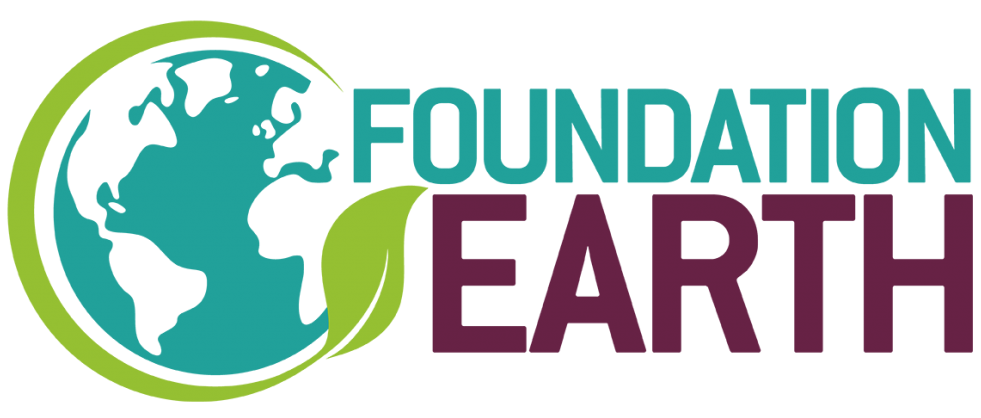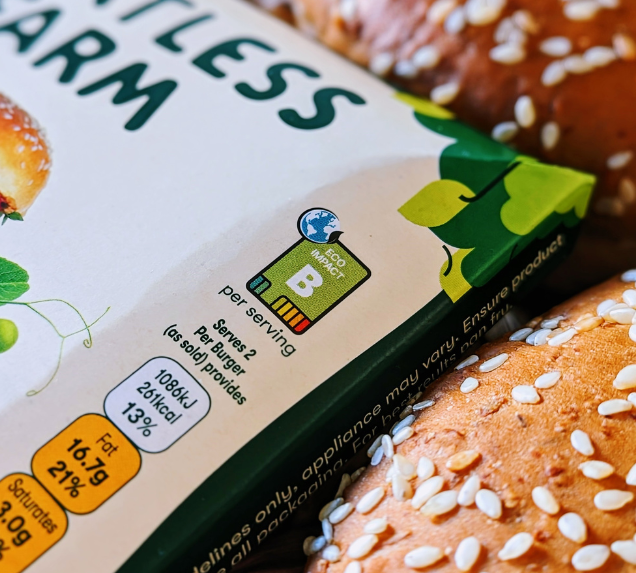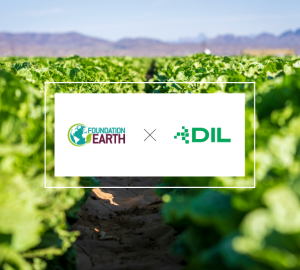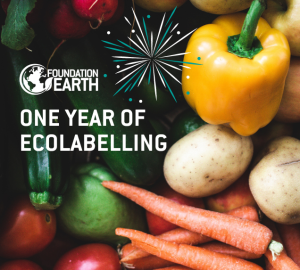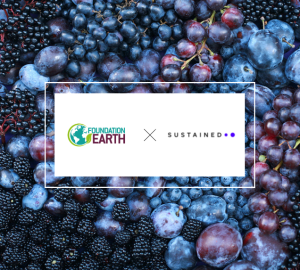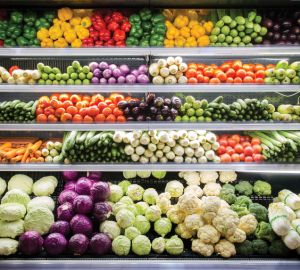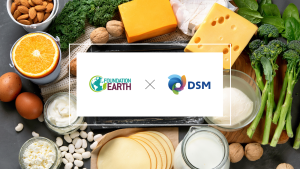We live in a world of unparalleled quantities and sources of data concerning the food we grow, process and eat. Whether you are a retailer, a consumer, a manufacturer, or a policy maker – there are seemingly countless ways to interpret it. This presents a real challenge, as actors across the value chain strive to become more transparent on the environmental impact data behind the food they produce and consume.
This vast array of data available is insufficiently standardised, is often opaque and inconsistent. Those factors can prevent individual food businesses, let alone entire food chains from making highly informed, optimal decisions – individually or multilaterally – to improve competitive advantage, brand equity and long-term security.
At the same time, all this data and information can make things more confusing for shoppers who want to be more sustainable, potentially limiting their ability to understand what to buy, from whom, and when, with confidence.
This can also be applied to measuring and publishing environmental insights: when it comes to truly measuring a product’s ecological impact, there is an inherent value and importance in accessing more standardised, verified, consistent, & science-based data to enable retailers brands – as well as their consumers – to make better, more informed decisions.
Foundation Earth: creating the gold standard for ecolabelling
At Foundation Earth we believe that accurately measuring the environmental impact assessment of any product across its lifecycle is a vital “golden thread” for an agri-food business’s long-term sustainability strategy.
Never has accurate and transparent environmental insights been so vital.
The Financial Times recently reported that just 20 per cent of food shoppers trust brands’ sustainability claims, while many businesses are reporting that poor access to data and supply chain transparency are stopping them from improving trust in their sustainability initiatives. Nearly 6 in 10 consumers are willing to change their shopping habits to reduce environmental impact, and of those who regard themselves as “very committed to action on sustainability”, 7 in 10 are willing to pay a premium for brands that provide this transparency. Alongside this very real increased environmental consumer pressure is the increasing environmental policy legislation coming down the line.

In response to this, Foundation Earth set out on a mission to provide the food industry and its customers with an accurate, trustworthy, and defensible measurement and grading of a product’s environmental impact, which can then be incorporated into a business decision with confidence, while also enhancing and supporting a business’s green credentials.
Three principals guide our environmental impact approach, and which shape our service.
- First, we are independent. There are many existing labels out there that are industry-sponsored, making it hard to trust the objectivity of what they communicate. Our belief is that consumers, faced with so many ecolabelling organisations and claims, perceive us as having greater credibility if we remain independent and neutral. We do not represent one business or sector of the food system over the other. We also recognise that the food system is planet-sized, and that supply chains operate in a globally connected manner. That is why we advocate for harmonised methods across several national and international policy approaches.
- Second, while we are commercially astute, we are ourselves a not-for-profit. This too is a conscious decision. Being mission-led means working with all food supply chain constituents on their customer journey, irrespective of budget or financial opportunity for us. We work for the public’s general good and to build a healthier planet.
- Third – our method, our adopted standards, and the open and third-party data sources (Agribalyse, EcoInvent, etc.) behind them are science-backed, making the labels we deliver evidence-based. On top of that, we are now developing a third-party verification system to ensure that we too are also rigorously compared and defended against other approaches.
The role of ecolabels
Our service is simple. We provide agri-food businesses with environmental data and insights on their products, translated into an ecolabel with a letter and colour score, that is based on a full lifecycle analysis of the food product.

We work with businesses to delve deeper into that analysis and those insights to aid decision-making on product and supply chain issues, ensuring the LCA process is compliant and the output certifiable. This may be used simply for internal reporting. Equally businesses may wish to go one step further and publicly share the ecolabel, putting it front-of-pack, or online to communicate the tangible data behind the score, and thus respond to the increasing demand for transparency that is expected from consumers.
Each published ecolabel is certified by Foundation Earth as a mark of quality.
The need to share a products’ environmental provenance and impact – or at the very least show a direction of travel to providing that transparency – is becoming more popular, given that 46% of consumers expect brands to take the lead on bringing about sustainable change.
That is why we work with all businesses across the supply chain: with those who are still trying to work out their overall sustainability strategy but unable to disclose it yet, or other businesses with a strong sustainable brand who wish to be compared with others in their food category or industry sector. Others again might have already published legitimate green claims and are now under pressure to scientifically defend them.
In all scenarios, going through a rigorous ecolabelling process can help each business, no matter where they are on that journey.
Tackling the challenge
Delivering transparency across the entire food system is a challenge for several reasons:
- First, harmonisation. Supply chains are global, and they are complex. Each one differs by actors, location, legislation and the data on each one rarely connects with others, let alone conforms to a common standard, consistent data modelling and defensible methodologies. There are currently over 232 ecolabels and schemes active in the EU that look at different indicators and measure impacts differently. We need to build more harmonised data methods and standards to reduce this fragmented and confusing picture for industry and consumers alike.
- Second, scale: the sheer complexity of supply chains coupled with the increasingly granular level of data captured requires scalable data management platforms, tools and technology, that can interrogate faster and more intelligently than ever before.
- Third, consumers are demonstrating stronger interest and commitment to sustainability, wanting to engage deeper than ever before. It is critical therefore that anyone selling them food is able to provide the insights and supporting data they seek.
- Forth, the food system is increasingly a knowledge system in its own right, where all entities within it must collaborate with others to improve the ability to provide nutritious, cost-effective and ecologically-sound food at scale. Multilateral insights and decisions are becoming more and more important to enable long term resilience.

Environmental impact through LCA
By adopting a full life cycle assessment approach, we put science at the heart of our labels.
We’ve spent the last few years analysing the science across an array of product life cycle data sources, gathering procedures, tools and assessment methods before electing on our direction. Our method is founded on a PEF-based methodology comprising 16 impact indicators measured across supply chain stages, from cradle to grave. We provide a highly scientific absolute and comparative assessment between same products at the same stage, between stages, and between different actors operating the same process. And as methods like PEF become even more granular as we progress, those learnings will be continuously integrated into our methodology updates.

Using high quality data
We work with several pre-approved Life Cycle Assessment providers who base their assessment on our approach to provide the retailer, supplier or brand with a grading and certificate per product SKU. That score is currently recertified yearly, allowing us not only to closely audit potential changes in a product’s environmental impact, but also allowing businesses to make improvements in their value change and score better the year later.
We also work with businesses and their technology platform partners to ensure this data can be integrated seamlessly into existing ERP, supply chain and cloud analytics systems set up to measure supply chain activity.
Read more: Foundation Earth joins forces with Fujitsu to map environmental data in the agri-food sector
Finally, we are also pioneering LCA automation to accelerate the adoption of meaningful, defensible environmental impact scores across more products, far cheaper.
Read more: Automation for food ecolabelling: Foundation Earth teams up with Sustained
Aligning with policy
We’ve seen a lot in the press recently about green claims and greenwashing, and the legislation coming in to enforce sustainability marketing claims. Until very recently, quantifying ‘sustainability’, for example physical or transitional climate risk exposure, carbon reduction, biodiversity loss, deforestation, and soil nutritional density, were not scientifically measurable at scale. But now we can measure those factors based on accepted scientific scenarios and baselines, and use it to back more rigorous action.
Equally, science-backed LCA methods need to align to national and regional policies globally, not just in the country you are HQ’d in. Why? Because policies governing an entire supply chain’s environmental impact will be increasingly defended downstream by the consumer face of the food industry, i.e. the brands and retailers.
Our vision for an optimum method
The method behind our robust lifecycle assessment approach itself encapsulates the key tenets and challenges mentioned above:
- A solution that endeavours to be system-wide, based on common standards and a common method.
- The use of primary data for ground truthing, not just secondary data from which to gather further inferences and subjectivity.
- The ability to measure change. We will eventually get to a point where supply chain environmental impact can be measured at the product SKU level: a crate of apples, a mushroom punnet, or even down to the individual chocolate bar with a high degree of environmental intelligence on the cocoa or sugar in its make up. We need to show how positive action has improved a prior rating or score.
- We also need to harmonise and standardiseprotocols across different industry groups, sectors, trading partners and actors in the supply chain.
- Lastly, it must be scalable, accessible and open to all.
Open source to scale
A few months ago we launched our open source approach and in that time, we have seen a significant uptick in interest from businesses keen to take our core standardised method and sources and iterate on them. In line with our mission to transform food systems for the better, going open source was a key action needed to increase transparency and allow for large uptake globally. For more details on our current open source-based methodology go to https://foundation-earth.org/resources
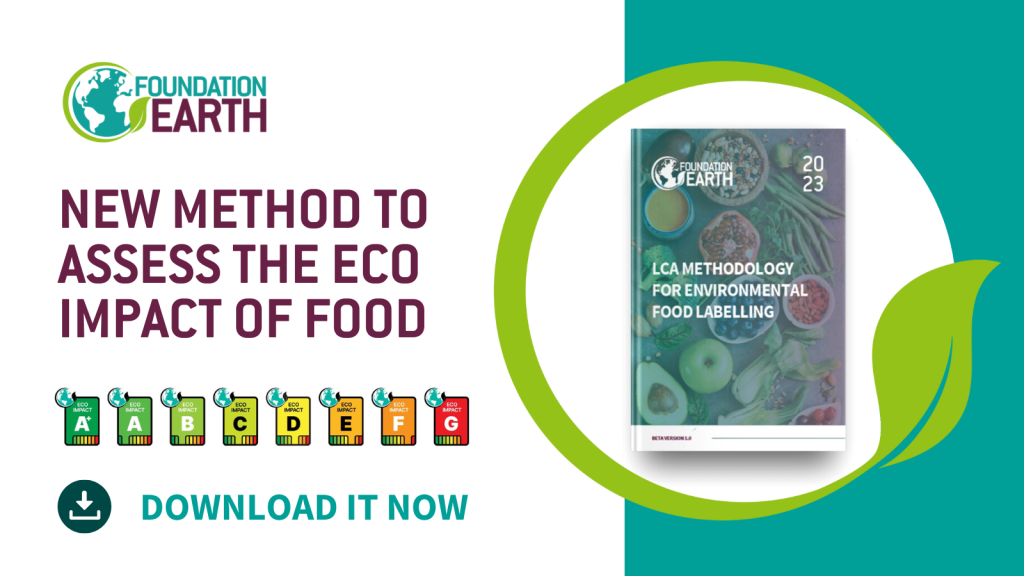
Who has joined us on our journey?
We have many food brands, retailers traders, associations of all sizes represented in our membership programme spanning UK and Europe, but we’re also now garnering interest in North America. We typically work with procurement, finance, sustainability and marketing teams who are charged with modelling, developing, launching then measuring sustainability initiatives designed to improve the organisation’s bottom or top line.
Case Study: Communicating the environmental impact of Abel & Cole’s organic fresh produce
But to bring forth the systemic approach desperately needed to enact true change, we are working with partners across science, technology, policy and civil society. One example is our partnership with Fujitsu, who are working with us to enable rapid and scalable tracking and tracing of product-level LCAs for more companies.
Lastly, our independent Science Committee ensures our developments are always science-based – and alongside representatives from European governments, UK brands, academic institutions and research establishments, we are working cross stakeholders to continuously better ourselves and work towards the most accurate and transparent way of communicate the environmental impact of food.
